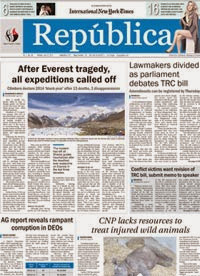Report on the use of language in the classroom - Learnings from Nepal
There is far too little research done on the impact of the choice of medium of instruction that is South Asia based. It is therefore worth noting a recent study done in Nepal on that issue. Data was collected from local government executives, head teachers, teachers and parents, Ministry officials etc. The study is affirming some of the things that the experts have been preaching (e.g. using the local languages increases engagement and learning), but also pointing at an important gap: There is a need for creating more clarity for teachers on how to use multiple languages in the classroom! A recent study was undertaken by UNICEF Nepal, CEHRD ( Center for Education and Human Resource Development ), UNESCO and the British Council in 2023. The full report of this study called ‘Understanding the Impact of Languages and Language Policies on Children’s Learning Outcomes in Nepal’ was released by the British Council in December 2023. The study was aimed at understanding how languag...


